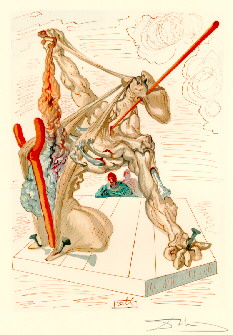





|
|
|
|
February 08, 2006
Fear becomes unspeakable
The last post touched on the role of fear in the context of free speech. I think what's being lost in the debate over the cartoons is not so much the wisdom of printing them, or even the right of any given newspaper to print them. It's the role of fear. While I'm too old to have experienced things like "hate speech codes" in the university setting, a younger person told me that it's been a big deal in many universities for years. There are things like "review boards" dedicated to hearing "charges" involving allegedly "hateful" remarks, and allegedly "offensive" remarks made between students. Students know that "offensiveness" is taken very seriously, and they are intimidated. I think that's fear, by any definition. The images of Muhammad, I was told, would be deemed "offensive" by virtually any university with rules against hateful or offensive speech. Now, I realize that this does not constitute censorship in the legal sense, because the government is not involved. But it was the contention of this former student that an entire generation of today's intellectuals had their psyches shaped by such intimidation. They were, simply, trained to kowtow to it the way a soldier is conditioned to salute an officer. Almost by instinct. "Huh?" was my reaction. "What about the Constitution?" Totally, laughably irrelevant to this argument. We're not talking about freedom here. We're talking elemental fear. (I just hope it's not becoming a cultural thing.) MORE: Baldilocks reviews the long history of Western and Islamic Muhammad depictions, noting the highly inflammatory nature of some of them: Many painters, including William Blake, Gustave Dore, Auguste Rodin and Salvador Dali, have depicted Mohammed in illustrations of Dante's Inferno, where the Muslim prophet ends up in hell with his entrails hanging out.The list of artistic depictions in the West is quite long; with hardly any research I found the following images listed in this catalogue: Baldilocks asks a very appropriate question: what has changed? So what is different now than, say, in 14th century Turkey or in the mid-twentieth century of Salvador Dali’s portrait? Two things: the obvious fact is that information is transmitted infinitely faster than ever before, even though the Danish cartoons in question were published in September of last year. Noting this 'delay in outrage' over the portrayals leads to the other obvious fact: it points to the present-day virulence of Islamo-facism.I this virulence is encouraged by fear. Oddly enough, Dali was intrigued and inspired by fear, and of course paranoia. His painting of "Mahomet" is certainly no exception:  The above was part of Dali's Divine Comedy series from the 1950s and 1960s. Is it more offensive today than it was then? Or are people just more fearful? posted by Eric on 02.08.06 at 08:58 AM |
|
December 2006
WORLD-WIDE CALENDAR
Search the Site
E-mail
Classics To Go
Archives
December 2006
November 2006 October 2006 September 2006 August 2006 July 2006 June 2006 May 2006 April 2006 March 2006 February 2006 January 2006 December 2005 November 2005 October 2005 September 2005 August 2005 July 2005 June 2005 May 2005 April 2005 March 2005 February 2005 January 2005 December 2004 November 2004 October 2004 September 2004 August 2004 July 2004 June 2004 May 2004 April 2004 March 2004 February 2004 January 2004 December 2003 November 2003 October 2003 September 2003 August 2003 July 2003 June 2003 May 2003 May 2002 See more archives here Old (Blogspot) archives
Recent Entries
• Holiday Blogging
• The right to be irrational? • I'm cool with the passion fashion • Climate change meltdown at the polls? • If you're wrong, then so is God? • Have a nice day, asshole! • Scarlet "R"? • Consuming power while empowering consumption • Shrinking is growth! • My dirty thoughts
Links
Site Credits
|
|
Another difference is there is a Muslim hate mongering industry. The Instapundit, Powerline, and some others were talking about this today. The weird thing is that industry, through Palestine grants and oil purchases, is largely funded by the West.